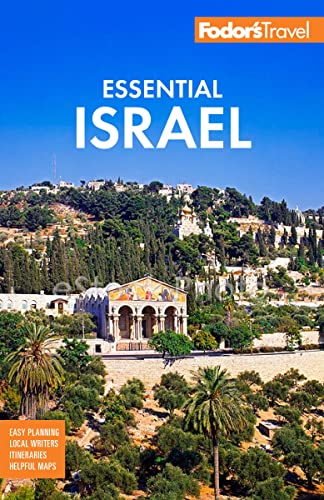Israel and the Performing Arts
Israel has a wealth of cultural activity that reflects both its ethnic diversity and its cosmopolitanism. Innovation and experimentation cross-pollinate traditional forms, creating an exciting Israeli performing-arts scene infused by West and East. Look for listings in sections of the Friday Haaretz (“The Guide”) and The Jerusalem Post (“Billboard”), available in many hotels. Online, www.timeout.com/israel will give you the latest updates on things to do.
Music
Israel’s traditionally strong classical and opera scene was enhanced a generation ago by a wave of immigrant musicians from the former Soviet Union. Apart from the deep reservoir of local talent, a steady stream of visiting artists, ensembles, and even full operatic companies enrich the scene every year. The world-renowned Israel Philharmonic Orchestra (www.ipo.co.il) is based in Tel Aviv but plays concert series in Haifa and Jerusalem as well. Look for the Jerusalem Symphony (www.jso.co.il) and Haifa Symphony orchestras (www.haifasymphony.co.il) in their respective cities, but smaller orchestras and ensembles appear in other, often remote, venues, too. Chamber music listings are full and varied: check out intimate auditoriums like the Felicja Blumental Center, the Israel Music Conservatory (Stricker), and the Tel Aviv Museum of Art in Tel Aviv; the Jerusalem Music Center (Mishkenot), the Eden-Tamir Center (Ein Kerem), and various churches in the holy city; and the Rappaport Hall and Tikotin (Japanese) Museum in Haifa.
The Israeli Opera (www.israel-opera.co.il) stages up to 10 productions per season (November to July), including a crowd-pleasing extravaganza at the foot of Masada (near the Dead Sea) toward season’s end. Its home base, the Tel Aviv Performing Arts Center (TAPAC), hosts smaller operatic and musical events as well.
Noteworthy annual festivals include the multidisciplinary Israel Festival (Jerusalem www.israel-festival.org.il), theAbu Gosh Vocal Festival (near Jerusalem www.agfestival.co.il), and three chamber music festivals: Upper Galilee Voice of Music (Kibbutz Kfar Blum), Eilat (Eilat www.eilat-festival.co.il), and Jerusalem International Chamber Music Festival (Jerusalem www.jcmf.org.il). Check websites for accurate dates for these events.
Popular Music: Israeli rock bands and balladeers fill radio playlists and venues around the country. Popular watering holes are Tel Aviv’s Zappa Club and an ever-changing list of places in the Tel Aviv Port, a nightlife center. Big foreign acts like Elton John, Madonna, and The Rolling Stones take over the Tel Aviv Performing Arts Center or the outdoor Yarkon Park.
Jerusalem doesn’t rock nearly as much as Tel Aviv, but look for cool gigs at Zappa at the Lab and Yellow Submarine. The weeklong midsummer Hutzot Hayotzer Arts and Crafts Festival in Sultan’s Pool, just outside Jaffa Gate, has good Israeli acts nightly for no extra charge.
Jazz, Ethnic, and World Music have come of age at Eilat’s Red Sea Jazz Festival (en.redseajazz.co.il), a twice-yearly jazz summit. The summer festival is a fixture on the international calendar, when local artists like trumpeter Avishai Cohen and his siblings return from the New York scene. The winter festival shines a light on home-grown talent. Tel Aviv's Shablul Jazz is the premier club, but pubs like Mike’s Place can be hot as well. Middle Eastern influences are common in Israeli pop songs—that’s a given—but even the quintessentially New World genre of jazz hasn’t escaped fusion with Yemenite or Ethiopian sounds.
The Jerusalem International Oud Festival celebrates a musical tradition that extends from Spain to India (www.confederationhouse.org).
The Upper Galilee mountain town of Tzfat (Safed), home of 16th-century Jewish mysticism, is the setting for the annual Klezmer Festival (www.safed.co.il). Expect three summer days of fiddles, clarinets, and Eastern European schmaltz.
The veteran Ein Gev Festival in April, on the eastern shore of the Sea of Galilee, is devoted to Hebrew songs, many of them in a choral format.
Dance
Israel owes its visibility on the world dance radar to modern, not ballet. Still, if tradition speaks to you, check the listings for the Tel Aviv–based Israel Ballet (www.iballet.co.il) or the more contemporary Jerusalem Dance Theater (www.jdtcom.com).
The center of Israeli modern dance is the finely restored Suzanne Dellal Centre for Dance and Theatre in Tel Aviv’s historic Neve Tzedek neighborhood. Its four performance halls are home ground for the veteran and world-renowned Batsheva Dance Company (www.batsheva.co.il)—with legendary artistic director Ohad Naharin—and the Inbal Pinto & Avshalom Pollak Dance Company (www.inbalpinto.com). The center’s season peaks with Summer Dance, a two-month feast of top local and international talent. Tel Aviv Dance is an autumn festival, while December brings the more intimate yet more intense International Exposure.
The field is much wider, however. The Kibbutz Contemporary Dance Company (kcdc.co.il) has a fine reputation, and the Jerusalem-based Vertigo Dance Company (www.vertigo.org.il) takes the audience into new territory. (Ensembles are constantly on the road: regardless of their home base, they might be performing near you.) The Israel Festival brings top-class acts to Jerusalem, and the capital now enjoys its own dance festival, Machol Shalem, in winter.
Theater
Theater in Israel is almost exclusively staged in Hebrew, with the exception of Tel Aviv’s Cameri Theatre, which presents some of its popular productions with English subtitles.
The Israel Festival in Jerusalem is the place to take in an array of the best of the performing arts.
Language may not matter at Jerusalem's annual International Festival of Puppet Theater (www.traintheater.co.il) in summer.
Film
Israel has a thriving film industry. The best movie meccas are the Cinematheques in Tel Aviv, Haifa, and Jerusalem. Most Israeli films have English subtitles. Real film buffs note the summer dates of the Jerusalem International Film Festival. The Haifa Cinematheque has a similar festival in fall (www.haifaff.co.il).
Tel Aviv celebrates White Nights in June—an all-night bash when most major museums, theaters, and clubs stay open.




